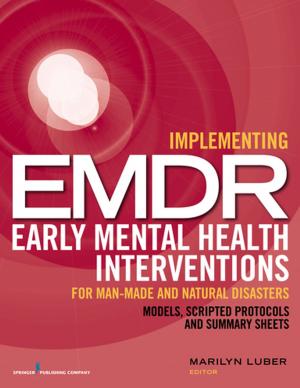Language and Narratives in Counseling and Psychotherapy
Nonfiction, Health & Well Being, Psychology, Counselling, Clinical Psychology| Author: | Scott Meier, PhD | ISBN: | 9780826108975 |
| Publisher: | Springer Publishing Company | Publication: | March 5, 2012 |
| Imprint: | Springer Publishing Company | Language: | English |
| Author: | Scott Meier, PhD |
| ISBN: | 9780826108975 |
| Publisher: | Springer Publishing Company |
| Publication: | March 5, 2012 |
| Imprint: | Springer Publishing Company |
| Language: | English |
"This is a useful book with carefully condensed material that will be useful to beginning counselors and other helping professionals. It takes a large and complex literature base and shakes it down to some core useful concepts that will whet the beginning student's appetite."
Rita Sommers-Flanagan, PhD Professor/Chair, Department of Counselor Education
, University of Montana
Narrative and language-based therapies help clients to see their presenting problems as separate from themselves through the assumption that they have many skills and competencies that will enable them to reduce the influence of problems in their lives. This highly accessible, step-by-step guide to incorporating principles of narrative and language-based approaches to therapy into practice demystifies these techniques for therapists and counselors in training. Illustrated with concrete examples and findings from empirical research, the text helps readers to understand the importance of language and narrative in the therapeutic alliance and to apply language- and narrative-based principles in counseling and psychotherapy.
In a concise, straightforward format designed to facilitate student learning, each chapter describes a set of related principles and practices that encompasses counselor/student dialogues, in-depth discussion of each principle, the empirical bases for these principles and practices, and student assignments that foster additional learning. The book also discusses the theoretical and philosophical foundation of narrative therapies including developments in emotion science and word use research and their translation to counseling practice.
Key Features:
- Provides step-by-step techniques for putting the principles of narrative and language-based therapies into practice
- Demystifies narrative and language-based approaches to therapy for therapists and counselors in trainingPresents concepts in the format of essential guidelines, building from basic ideas to more complex and advanced principles
- Includes empirical research to demonstrate validity of the principles of narrative and language-based therapies
- Contains counselor/student dialogues and assignments to foster additional learning
"This is a useful book with carefully condensed material that will be useful to beginning counselors and other helping professionals. It takes a large and complex literature base and shakes it down to some core useful concepts that will whet the beginning student's appetite."
Rita Sommers-Flanagan, PhD Professor/Chair, Department of Counselor Education
, University of Montana
Narrative and language-based therapies help clients to see their presenting problems as separate from themselves through the assumption that they have many skills and competencies that will enable them to reduce the influence of problems in their lives. This highly accessible, step-by-step guide to incorporating principles of narrative and language-based approaches to therapy into practice demystifies these techniques for therapists and counselors in training. Illustrated with concrete examples and findings from empirical research, the text helps readers to understand the importance of language and narrative in the therapeutic alliance and to apply language- and narrative-based principles in counseling and psychotherapy.
In a concise, straightforward format designed to facilitate student learning, each chapter describes a set of related principles and practices that encompasses counselor/student dialogues, in-depth discussion of each principle, the empirical bases for these principles and practices, and student assignments that foster additional learning. The book also discusses the theoretical and philosophical foundation of narrative therapies including developments in emotion science and word use research and their translation to counseling practice.
Key Features:
- Provides step-by-step techniques for putting the principles of narrative and language-based therapies into practice
- Demystifies narrative and language-based approaches to therapy for therapists and counselors in trainingPresents concepts in the format of essential guidelines, building from basic ideas to more complex and advanced principles
- Includes empirical research to demonstrate validity of the principles of narrative and language-based therapies
- Contains counselor/student dialogues and assignments to foster additional learning















